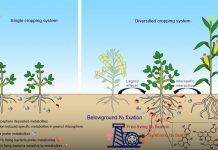Chao Wang Xue Qiang Zhao Rong Fu Chen Hai Yan Chu Ren Fang Shen. Aluminum tolerance of wheat does not induce changes in dominant bacterial community composition or abundance in an acidic soil. Plant and Soil 2012 DOI: 10.1007-s11104-012-1473-3.
Abstract
Aims
Aluminum-tolerant wheat plants often produce more root exudates such as malate and phosphate than aluminum-sensitive ones under aluminum (Al) stress which provides environmental differences for microorganism growth in their rhizosphere soils. This study investigated whether soil bacterial community composition and abundance can be affected by wheat plants with different Al tolerance.
Methods
Two wheat varieties Atlas 66 (Al-tolerant) and Scout 66 (Al-sensitive) were grown for 60 days in acidic soils amended with or without CaCO3. Plant growth soil pH exchangeable Al content bacterial community composition and abundance were investigated.
Results
Atlas 66 showed better growth and lower rhizosphere soil pH than Scout 66 irrespective of CaCO3 amendment or not while there was no significant difference in the exchangeable Al content of rhizosphere soil between the two wheat lines. The dominant bacterial community composition and abundance in rhizosphere soils did not differ between Atlas 66 and Scout 66 although the bacterial abundance in rhizosphere soil of both wheat lines was significantly higher than that in bulk soil. Sphingobacteriales Clostridiales Burkholderiales and Acidobacteriales were the dominant bacteria phylotypes.
Conclusions
The difference in wheat Al tolerance does not induce the changes in the dominant bacterial community composition or abundance in the rhizosphere soils.







